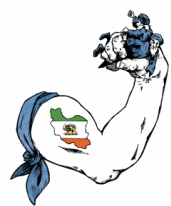An al Qaeda strategist issued a statement
over the weekend threatening that unless Canada withdraws its troops from
Afghanistan, it will face terrorist attacks similar to 9/11 or the Madrid and
London train bombings. Given al Qaeda's penchant for issuing threats, this
statement by itself does not indicate a particularly heightened level of risk
for Canadians, who have been in al Qaeda's crosshairs since the jihadist war
with the West began. But then, al Qaeda is not known for making one-off
threats.
In fact, the statement -- attributed to Hossam Abdul Raouf,
a member of al Qaeda's information and strategy committee -- marked the
second time in recent weeks that jihadists have singled out Canada for
special mention over the prominent role it is playing in Afghanistan. In
September, Ayman al-Zawahiri referred to the Canadian troops in Kandahar as
"second-rate Crusaders." Along with these remarks has come a separate warning
from the Taliban
threatening attacks on the soil of European countries that are part of the
NATO offensive in Afghanistan.
That is worth saying again, with
emphasis: The Taliban -- a nationalist religious movement --
threatened to carry out attacks against civilians on foreign soil, blurring
the already fuzzy line between the Afghan group and its transnational
militant counterpart, al Qaeda.
The timing of all of these statements
centering on Afghanistan seems hardly accidental. In Canada, there is growing
sentiment that Prime Minister Stephen Harper's Conservative government is
putting the country at risk by aiding what is perceived as, in truth,
Washington's war. Canadian forces were deployed to Afghanistan under a
Liberal government, but the Harper administration extended the length of the
mission and, critics say, changed the mandate from peacekeeping to
insurgent-fighting. With recent news that Canada is preparing to send Leopard
tanks and CF-18 fighter jets into the fray, the country's military
capabilities will be fully represented in Afghanistan -- and there is no
fallback position if it then fails to defeat the Taliban. Voters also are
dissatisfied over the absence of milestones by which to chart progress or
determine an end point for the mission, and they are worried about the
possibility of terrorist strikes
on their own soil.
The general tenor of discussion is not
unlike that in the United States, where the tally of Iraq war casualties is
now a daily drumbeat underlying news coverage of the congressional election
campaigns. There are some crucial differences, however: Because Afghanistan
was a sanctuary for al Qaeda for years, the military invasion has never
excited the kinds of political controversies that surround the Iraq war effort.
While the attention of Americans and much of the world
remains riveted on Iraq, the campaign in Afghanistan continues to grind away.
But the outcome of this campaign -- at least as much as that in Iraq, if not
more so -- has direct implications for the "global war on terrorism." As
such, it bears careful consideration.
A Shift in the Military
Balance
The recent spate of threats -- and particularly those from
the Taliban -- is rooted, at least to some degree, in an increasingly
confident military footing.
For most of Afghan President Hamid
Karzai's time in power, the military situation has been primarily a
stalemate. The young government in Kabul was not strong enough to control
most of the country's territory, but was shored up by U.S.-led forces. The
coalition forces were not able to eliminate the Taliban, which continued to
move about with relative freedom in several southern provinces, but neither
was the Taliban strong enough to quash either the coalition forces or the
government in Kabul. The Karzai administration remained secure, though its
power was circumscribed, and the Taliban waged a small- to medium-scale
insurgency in the southern and eastern parts of the country.
This
balance began to shift early last year. The Taliban, assisted by al Qaeda,
began to engage in suicide bombings, surging to the north and east of their
southern strongholds (where the guerrilla offensive continued). In fact,
Taliban fighters were able to strike as far north as Kabul. This year, the
frequency and intensity of these attacks climbed: So far, there have been
some 80 suicide attacks, claiming more than 200 lives, compared to fewer than
20 in 2005. And in recent months, Western troops -- not just rival political
targets in Afghanistan -- have been targeted with both suicide bombings and
improvised explosive devices.
Perhaps the most noteworthy trend in
all of this is that Taliban forces appear to be retaking some of the
territory they lost following the U.S.-led invasion in 2001. They long have
shown an ability to move in and out of the five key provinces where their
strongholds are based -- Helmand, Kandahar, Uruzgan, Zabul and Paktika -- but
there now are signs that Taliban fighters could be, if not holding more
ground, at least shoring up their support in outlying areas.
 div>
div>In
fact, the Afghanistan Independent Human Rights Commission in August went so
far as to claim the Taliban now have "psychological and de facto military
control of nearly half of Afghanistan," mapping out a line of control that
runs right through the country's middle. We do not believe the Taliban firmly
controls all of southern Afghanistan, but the line of control does conform
with the areas of Taliban activity we have observed in recent
months.
Sources of Strength
Several factors, both
foreign and domestic, paved the way for this surge of Taliban influence.
Let's consider these in turn:
- The U.S. military stance:
After forcing the Taliban from power, U.S. and coalition forces -- with too
few troops to adequately control a large and difficult terrain -- moved to
staging periodic anti-Taliban operations in southern and eastern Afghanistan.
These periodic disruptions, however, were followed by entrenchment, with the
Taliban resettling and digging in between offensives. - The
military transition: Over the summer, U.S. forces began to surrender
responsibility for the southern and eastern provinces to other NATO states,
whose forces (even by their own admission) were ill-prepared to deal with the
fierce insurgency there. Meanwhile, there appears to have been an influx
of foreign jihadists, swelling the ranks of Taliban
supporters. - The economic situation: Though the Karzai
administration has scored notable achievements -- crafting a new constitution
and providing a system of elections at all levels of government -- it has not
been able to improve the economy or the daily life of Afghan citizens. In a
country that never fully recovered from the massive devastation visited on it
by the Soviets, this would be an uphill battle for any government. One of the
key points of friction for the Karzai government, however, is that it has
cracked down on production of the main cash crop -- poppies -- leaving many
Afghans without alternative forms of income. The Taliban, of course, have
moved to capitalize on the discontent, reportedly offering money to new
recruits and offering social services, such as medical care, for supporters.
In some areas, the Taliban apparently have established parallel governments
that include district administrators, judges and other officials.
There are other divisions that the Taliban exploit: ethnic
ties and clan loyalties, for example, or the rift in cultural traditions. The
U.S.-aligned Karzai government is portrayed as chipping away at good,
old-fashioned religious and tribal mores. But the economic arena is where the
rubber truly meets the road: NATO's top commander in Afghanistan, British
Gen. David Richards, warned Oct. 8 that a majority of Afghans likely will
turn toward the Taliban if their lives do not tangibly improve during the
next six months.
Psychological Warfare
If Richards'
assessment is correct, it takes little imagination to envision what could
follow. Memories of the Soviet withdrawal and the painful civil war that
ensued spring quickly to mind. For coalition states in the West, the failure
of Operation Enduring Freedom (or "Operation Enduring Frustration," as one
U.S. senator recently dubbed it) would be a crushing political blow. Finally,
there is the distinct possibility that Afghanistan,
or at least significant portions of it, could again become a sanctuary for
transnational Islamist militants (and certainly, the top al Qaeda leaders now
believed to be sheltering in northwestern Pakistan wouldn't have far to
travel.)
This is not a foregone conclusion, of course, but the stage
does appear to be set for intensifying military conflict in Afghanistan as
the Taliban move to consolidate their gains. With the annual fighting season
drawing to a close, it is interesting that the jihadists have lately been
waging a psychological offensive, targeting not only the Canadian and other
NATO troops who patrol the roadways of Afghanistan, but also -- with a wave
of threats and warnings -- their home countries and communities. This could
be construed as an effort to maintain psychological momentum during the
winter, until frozen mountain passes thaw in the spring and military
offensives can begin again in earnest.
The recent statements of Mullah
Dadullah, a top Taliban military commander, are particularly intriguing in
this regard. In a Sept. 17 interview with ABC News, he claimed to have 500
suicide bombers under his command, willing to deploy at any time, and said
that 12,000 Taliban fighters were fighting under him in four southwestern
provinces. "We have no shortage of fighters," he said. "In fact, we have so
many of them that it is difficult to accommodate and arm and equip them. Some
of them have been waiting for a year or more for their turn to be sent to the
battlefield." Dadullah also was quoted as saying the Taliban is gathering
strength to launch bigger attacks in Afghan cities -- particularly Kabul --
next spring. And he expressed his opinion that the United States had cleverly
handed responsibility for Afghanistan's most dangerous provinces off to
British, Canadian and Dutch allies and withdrawn.
Now, in terrorism
analysis, we steer toward the view that those who have knowledge of specific
operations or targets don't talk, and that those who talk, don't know. It's a
rule of thumb that makes fairly specific operational statements like
Dadullah's quite interesting to consider. We are in no position to judge
whether his numerical estimates are on track -- though if they are, larger
military formations, which would create easier targets for NATO airstrikes,
likely would be avoided in favor of a higher tempo of small-unit guerrilla
engagements. His mention of Kabul, where foreign troops and the enemy
government are centered, divulges nothing that would not be otherwise be
reasonably assumed. The statement on the whole is designed to be a
psychological weapon, used to drive a wedge between NATO allies and stir up
dissent among the public in NATO states.
Together, the Taliban and al
Qaeda appear to be using the psychological weapon in a focused way,
attempting to break the back of political support for the war effort in
Canada and other U.S.-allied countries. The jihadists are very much aware of
the tone of Canadian politics and want to capitalize on the public's
misgivings about the war effort. For the Taliban and al Qaeda, fueling the
existing malaise in the war-weary West -- or forcing a general crisis of
confidence among the coalition partners -- could be an effective way of
weakening them all over the long term.
Whether the Taliban will
manage to follow up this psychological offensive and consolidate their
military successes when the fighting season resumes next spring is, at this
point, an open question. But their staying power, after five years of
warfare, is not.
Send questions or comments on this article to analysis@stratfor.com.
Comments Page
Comments Page

















